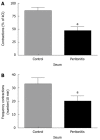Altered spontaneous contractions of the ileum by anesthetic agents in rats exposed to peritonitis
- PMID: 19340905
- PMCID: PMC2669946
- DOI: 10.3748/wjg.15.1620
Altered spontaneous contractions of the ileum by anesthetic agents in rats exposed to peritonitis
Abstract
Aim: To investigate in vitro effects of propofol, midazolam and dexmedetomidine, which are commonly used anaesthesic or sedatives, on spontaneous contractions of the ileum both in normal rats and those exposed to hyperdynamic peritonitis.
Methods: Spontaneous contractions of isolated ileum muscle segments from sham operated rats and those exposed to peritonitis, were studied in vitro. The amplitude and the frequency of spontaneous contractions of ileum muscle segments were studied after adding dexmedetomidine, propofol, and midazolam to the organ bath in a cumulative manner.
Results: Both amplitude (85.2 +/- 6.6 vs 47.4 +/- 7.1) and frequency (32.8 +/- 4.6 vs 20.2 +/- 3.9) of spontaneous contractions in ileum smooth muscle segments were decreased significantly in the peritonitis group compared to the control group (P < 0.05). Dexmedetomidine significantly increased the amplitude of spontaneous contractions (85.2 +/- 6.6 vs 152.0 +/- 5.4, P < 0.05) whereas, propofol (85.2 +/- 6.6 vs 49.6 +/- 4.8, P < 0.05) and midazolam (85.2 +/- 6.6 vs 39.2 +/- 4.5, P < 0.05) decreased it in both control and peritonitis groups. The frequency of spontaneous contractions were significantly decreased by propofol in both control (32.8 +/- 4.6 vs 18.2 +/- 3.4, P < 0.05) and peritonitis groups 20.2 +/- 3.9 vs 11.6 +/- 3.2, P < 0.05). Dexmedetomidine and midazolam did not cause significant changes in the number of spontaneous contractions in both control and the peritonitis groups (P > 0.05).
Conclusion: Propofol, midazolam and dexmedetomidine have various in vitro effects on spontaneous contractions of the rat ileum. While dexmedetomidine augments the spontaneous contraction of the rat ileum, propofol attenuates it. However, the effects of these compounds were parallel in both control and peritonitis groups.
Figures




References
-
- Ritz MA, Fraser R, Tam W, Dent J. Impacts and patterns of disturbed gastrointestinal function in critically ill patients. Am J Gastroenterol. 2000;95:3044–3052. - PubMed
-
- Martin B. Prevention of gastrointestinal complications in the critically ill patient. AACN Adv Crit Care. 2007;18:158–166. - PubMed
-
- Inada T, Asai T, Yamada M, Shingu K. Propofol and midazolam inhibit gastric emptying and gastrointestinal transit in mice. Anesth Analg. 2004;99:1102–1106, table of contents. - PubMed
-
- Koyluoglu G, Bagcivan I, Karadas B, Guney C, Durmus N, Altun A, Kaya T. Alterations in spontaneous contractions of rat ileum and jejunum after peritonitis. Eur J Pharmacol. 2008;580:250–255. - PubMed
-
- Martin CM, Yaghi A, Sibbald WJ, McCormack D, Paterson NA. Differential impairment of vascular reactivity of small pulmonary and systemic arteries in hyperdynamic sepsis. Am Rev Respir Dis. 1993;148:164–172. - PubMed
MeSH terms
Substances
LinkOut - more resources
Full Text Sources

